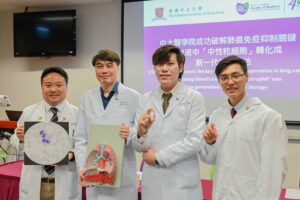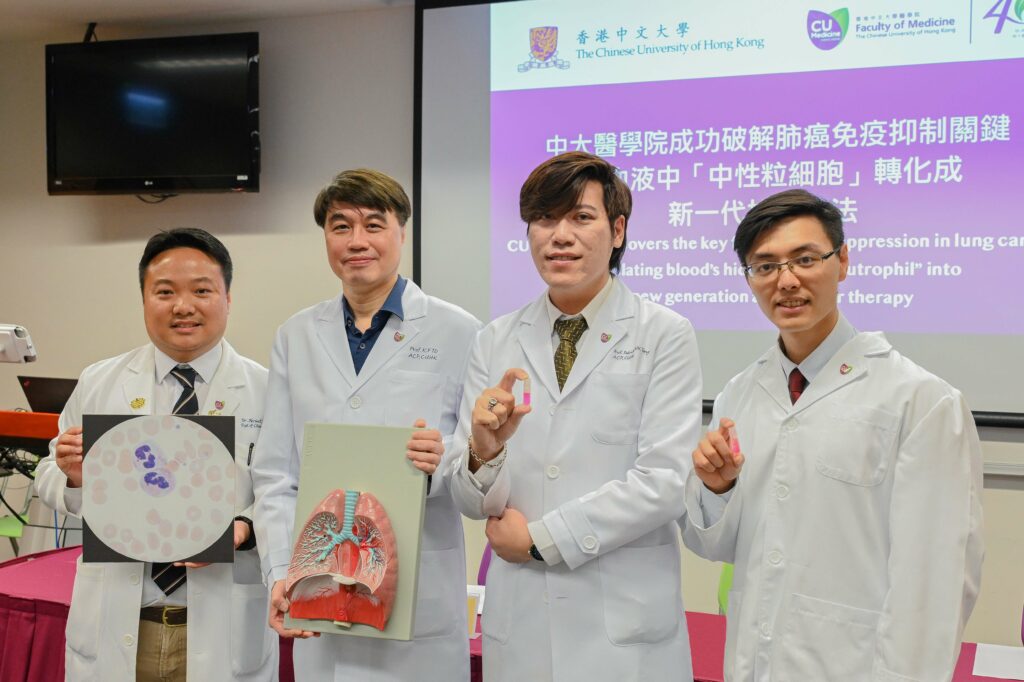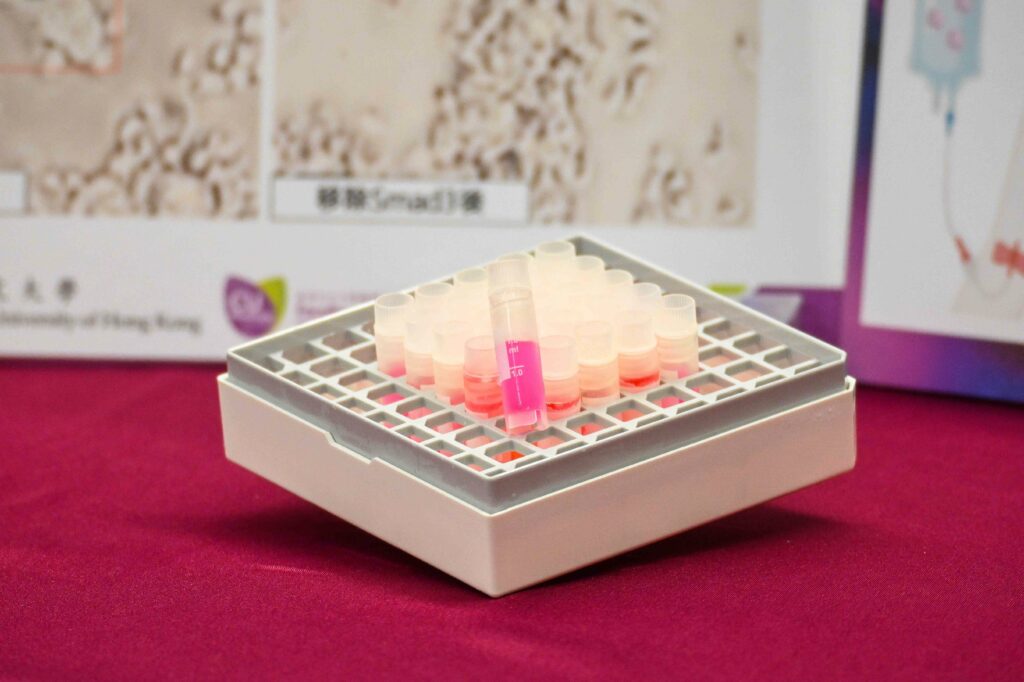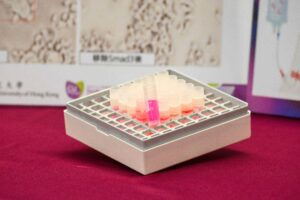CUHK
News Centre
CU Medicine uncovers the key for immune suppression in lung cancer Translating blood’s hidden gem “Neutrophil” into a new generation anti-cancer therapy
Lung cancer remains the most common cancer in Hong Kong. As a leading cancer killer worldwide, its treatment still needs a breakthrough. Recent research from The Chinese University of Hong Kong (CUHK)’s Faculty of Medicine (CU Medicine) has discovered that neutrophils, the most abundant immune cell type in our blood, play a key role in lung cancer. The team successfully enhanced the anticancer capacity of human neutrophils with gene editing technology and confirmed their clinical potential on lung cancer animal models, suggesting them as the next generation immunotherapy that can overcome existing therapeutic barriers. Research results have been published in the leading international scientific journal Nature Communications.
According to the Hong Kong Cancer Registry, there are more than 5,000 new cases of lung cancer and about 4,000 related deaths in Hong Kong every year. Immunotherapy has begun to be applied to lung cancer in addition to the traditional chemotherapy and targeted therapy. However, checkpoint inhibitors, the most used immunotherapy in lung cancer, can only benefit 30% of lung cancer patients when used alone. A better understanding of the uniqueness of the lung cancer microenvironment may shed new light on existing clinical dilemmas.
Understanding immunodynamics in lung cancer is the key to resolve its clinical dilemma
Neutrophils are the most abundant white blood cells in our blood for defending microorganisms and viruses. However, their role in cancer is still unclear. Recent studies found that neutrophils are abundant in the microenvironment of lung cancer and closely related to cancer cell growth and drug resistance. It implies that there should be a not yet defined mechanism for suppressing the anti-cancer activity of neutrophils in the lung cancer microenvironment.
Professor Patrick Tang Ming-kuen, Assistant Professor from the Department of Anatomical and Cellular Pathology at CU Medicine, stated, “After neutrophils enter the tumour from blood, their roles and functions are dramatically changed due to the different microenvironment, leading to either anti-cancer N1 or pro-tumour N2 states with an unknown mechanism. The latest single-cell bioanalysis technology allows our team to investigate the dynamics and regulation of neutrophils in the lung cancer microenvironment, in order to identify an effective therapeutic strategy for enhancing patients’ anti-cancer immunity in clinic.”
The research team observed that neutrophils in lung cancer patients predominately exhibit the pro-tumour state, while those in anti-cancer form are rarely found. Dr Jeff Chung Yat-fai, Postdoctoral Fellow from the Department of Anatomical and Cellular Pathology at CU Medicine, explained, “Using single-cell RNA sequencing analysis, we unexpectedly found that neutrophils in the lung cancer microenvironment will first exhibit the pro-tumour state N2, then need further development to display their anti-cancer state N1. Our discovery breaks through the existing scientific knowledge.”
The first study translates neutrophils into a new generation immunotherapy for lung cancer
The team further used advanced bioinformatics to successfully identify an immune regulatory molecule Smad3 as the key for suppressing the anti-cancer capacity of neutrophils in the lung cancer microenvironment. They demonstrated that genetic deletion or drug inhibition of Smad3 in neutrophils can markedly increase N1 cells in tumour, thereby preventing lung cancer growth in mouse models.
Professor Patrick Tang, emphasised, “This is the first study to identify that Smad3 plays a key role in the immunosuppression of tumour-associated neutrophils, which means that the molecular regulatory mechanism of neutrophils can become an effective therapeutic target for lung cancer.”
Dr Herbert Loong Ho-fung, Associate Professor from the Department of Clinical Oncology at CU Medicine, opined, “In fact, neutrophils are innate immune cells that are easily obtained from our blood. Since neutrophil transplantation will not cause rejection, more patients can be benefited. Therefore, neutrophils are expected to overcome the clinical barriers of the current T cell immunotherapy. We look forward to seeing more breakthrough discoveries that will transform neutrophils into an effective and new clinical strategy for lung cancer.”
Professor To Ka-fai, Chairman of the Department of Anatomical and Cellular Pathology at CU Medicine, added, “Importantly, this study led to the first patented invention using gene engineering to mass produce anti-cancer neutrophils from human blood. They effectively inhibit human non-small cell lung carcinoma in vitro and in vivo, revealing the possibility of developing neutrophils into a novel immunotherapy. We hope to further translate our research discovery into a safe and effective new generation of immunotherapy for solid cancers.”
This study was supported by the Research Grants Council and CU Medicine’s “Passion for Perfection” scheme and Faculty Innovation Award. Other key participants in the study included Prof. David J. Nikolic-Paterson of Monash University, Postdoctoral Fellow Dr Philip Tang Chiu-tsun and PhD student Mr Max Chan Kam-kwan from CU Medicine.
The original study can be accessed here: https://www.nature.com/articles/s41467-023-37515-8.

CU Medicine’s research team successfully enhanced the anticancer capacity of human neutrophils with gene editing technology and confirmed their clinical potential on lung cancer animal models, suggesting them as the next generation immunotherapy that can overcome existing therapeutic barriers.
(From left) Dr Herbert Loong, Associate Professor from the Department of Clinical Oncology; Professor To Ka-fai, Chairman; Professor Patrick Tang, Assistant Professor; and Dr Jeff Chung, Postdoctoral Fellow, from the Department of Anatomical and Cellular Pathology, at CU Medicine.






